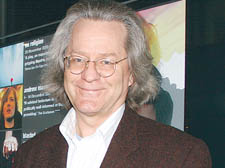|
|
 |
| |

Grayling: a philosopher who wants to have some influence on the world |
How the liberal west was won
Christopher Price reviews AC Grayling’s study of the emergence of political rights over the past 500 years
IN his latest book, AC Grayling, professor of philosophy at Birkbeck College, University of London, turns his attention to liberty and the rights of man and in doing so he does much to humanise the historical record.
He distinguishes trying to tell “the complexity of actual events” in the lives of ordinary people at the time from orthodox historical narratives which he categorises as “the victors’ stories”.
He spends much time destroying the enemies of liberty – divine right, absolutism, ideology, religious bigotry – even belief; and his broadsides against certain anti-libertarian benighted individuals – in particular Torquemada, leader of the Spanish Inquisition, and protestant theologian John Calvin – are impressive.
His home-grown heroes are John Milton, John Locke, William Hazlitt, Tom Paine and Lord Acton, together with a clutch of lesser-known continental intellectuals who were crusaders for liberty, especially Michael Servetus and Sebastian Castellio who helped ensure after the Reformation that protestants did not turn out quite unsound and fallacious – from his point of view – as catholics; he especially admires the early scientists for destroying the self-serving absolutisms of religion: from Galileo (“he knew he had lost a battle and won a war”) through Bacon and Newton onwards – the authentic natural philosophers of the day.
Because the scope of the book is Western Europe and the US over the past 500 years, Grayling’s alternating tapestry of history and philosophy over this relatively short space and time makes the book a discursive affair, with rather more history than philosophy in it.
His one philosophical disputation is with Lord Acton who wanted liberty but saw it founded in religion. Service to God was perfect freedom. Nor does he seek to cover the psychological and social sciences alongside the physical ones.
Psychoanalysts should not expect any Freudian or Jungian insertions into his quest for individual liberty; nor should political scientists expect a discourse on Liberty and Capitalism.
Grayling’s justification for writing this book on this particular period at this particular time is that he sees the former triumphs of political liberty beginning to falter. To him the fall of the Berlin wall was a “liberty” summit and he asks whether religion-driven terrorism today will find us “climbing down the other side of Parnassus”.
He sees the steady arrival of individual liberty as a tide in the affairs of men, almost entirely unleashed by courageous individuals confronting the selfish and the powerful.
There is much less analysis of life’s unforeseen accidents – what Harold Macmillan used to describe as “events, dear boy” – which often send politics into arthritic stasis and keep the majority oppressed, and he has less to say of technology, affluence and media dominance than others would. He is painting a picture of liberty’s history for a generation which knows little of it.
Grayling is one of a new breed of philosophers who want to have some influence on the world. This makes the book more of a romantic story than academic tract, a very personal attempt to present a snapshot of where we are today for the benefit of secular liberals in the 21st century.
It is an attempt, he says in a beautifully arresting phrase, at “isolating and extracting a central nerve” in the spinal cord of emerging liberty.
I also liked the book’s unabashed patriotism. The theme throughout is that it was Britain and its American colonies which led way to liberty.
The five appendices – entitled Landmarks on the Road to Freedom – with which the argument concludes, begin with our 1688 Bill of Rights which substituted a parliamentary monarchy for the divine right of kings.
Other nations’ statements on liberty seem to follow us as of necessity – the US Bill of Rights, the French Declaration of the Rights of Man and the UN Declaration of Human Rights in 1948.
The message is almost: “We won the War for Liberty in the West.” It is a proposition which the ghosts of Descartes, Diderot and Voltaire might contest.
Grayling ends the book with a raft of uncertainties and unanswered questions. How safe a protection of liberty is democracy? A sovereign House of Commons sounds good – but is it a privileged group which has inherited a new divine right? Is there any hope for world government? How much faith can we have in international institutions from the UN to the International Court of Justice? Grayling does not answer these questions – as is the privilege of philosophers.
But he does put individual liberty and rights in a context where its unique importance shines forth.
 |
 |
|
 |
 |
|
 |
|



